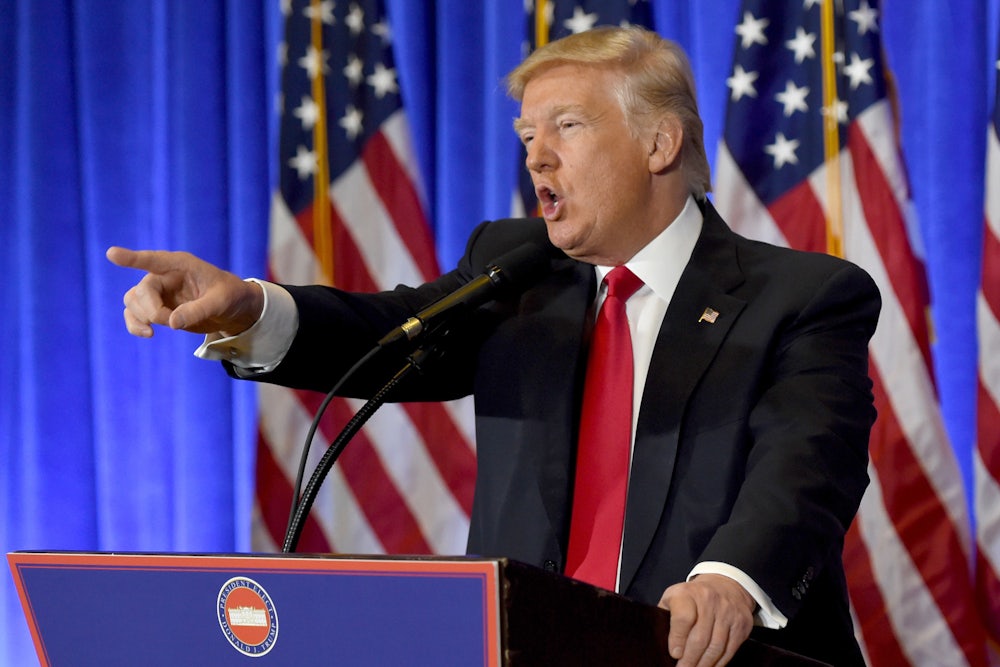The nominal purpose of President-elect Donald Trump’s press conference on Wednesday, 168 days in the making, was to announce the disentanglement of his business interests from the public interest. By Tuesday evening—thanks to CNN’s careful but explosive reporting and BuzzFeed’s intemperate decision to publish an opposition research memo compiled by a former spy—it seemed Trump would also have to dispel questions about his vulnerability to foreign blackmail and illegal collaboration between his campaign and Moscow.
In the end, Trump did neither. He announced instead that his sons would run the family business, but that he would fire them if they lost money over the course of his presidency, and he left the lectern amid questions about his advisers’ connections to Russian officials. (Later, in a scrum with reporters after the spectacle was over, he would unconvincingly deny any Russia connections.)
While this was happening at Trump Tower in New York, Republicans in Washington were grappling with the challenge of vetting and confirming an unusually unqualified group of people to serve in Trump’s cabinet. Trump has also confronted GOP leaders with abandoning their “repeal and delay” plan to eliminate Obamacare, and in an aside Wednesday, revived his campaign pledge to use regulation and government purchasing power to bargain down the price of prescription drugs—a good idea most congressional Republicans vehemently oppose.
In just about every way, Trump’s pre-presidency has mirrored his erratic campaign, which saddled the Republican Party with scandal and simultaneously threatened to displace cornerstones of the conservative policy agenda. The reasons Republicans didn’t want Trump to win the GOP nomination—and why some privately hoped he’d lose—turned out to be well founded. He won the election despite these liabilities.
As we get deeper and deeper into the Trump era, it becomes harder and harder for skeptical Republicans to credibly distance themselves from him; their identities become further linked every day to a president who will take office with historically abysmal approval ratings. Their best hope for avoiding political and substantive pitfalls to come would be to take active steps to stop Trump from corrupting the U.S. government, or to impose doctrinaire conservative policy on him, or both.
But there are things that matter more to congressional Republicans than the comforts of working with an orthodox and ethically upright president—and for those reasons they will silently resign themselves to the spectacle they know is coming.
Trump can enforce discipline on congressional Republicans almost effortlessly, with a combination of carrots and sticks that are fixed aspects of his relationship with them. The carrots are the points of policy consensus between Trump and Republican members of the House and Senate. The sticks are the ways that Trump can credibly threaten the careers of many House Republicans, and even some Senate Republicans, if they challenge him.
Set aside the frighteningly real concern that Republicans who cross Trump will see their emails plastered all over the Internet. Trump’s unpopularity masks the powerful effects of partisan polarization. His overall approval rating may be a dismal 37 percent, but in a polarized environment, that level of support means he is overwhelmingly popular among Republican voters and beloved by the GOP base. For most Republicans, opposing him would invite bigger political problems than they’ll willingly accept.
Looking the other way, by contrast, comes with valuable spoils.
But there are signs of growing unity between Trump Tower and Hill. Tax cuts, in particular, seen as an area where there's consensus.
— Robert Costa (@costareports) January 11, 2017
By abandoning even the pretense of congressional oversight, Republicans are leaving it almost entirely to reporters to scrutinize Trump’s ethical and legal conduct. But as he demonstrated on Wednesday, he has no misgivings about slandering news outlets (or any institutions really) that reveal unflattering things about him.
And the same polarization that makes him broadly unpopular, but enduringly popular with GOP voters, will insulate him from the political consequences of scandal. The result is that Trump will be able to operate with impunity for the foreseeable future. If he becomes so reviled that Republicans are no longer scared of him, they might finally arrest the damage—but we’ll have to wait until then to know the full toll.
